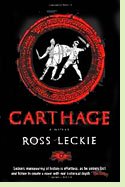Carthage
by Ross Leckie
Reviewed by David Maclaine

Carthage concludes Leckie's trilogy on the life and legacy of Hannibal. Whereas the bitter malice of Cato the Censor is a secondary theme of Scipio Africanus, the previous novel, in Carthage it is the driving force that leads to mass slaughter and the destruction of a great city. It is also the dominant voice in this multi-stranded epistolary novel. Others include a former servant of both Hannibal and the man who defeated him, Bostar, who schemes to place the Carthaginian general's illegitimate son in command of a resurgent Carthage, and Scipio's own son, who against his own better impulses finds himself locked in a mortal struggle against the heir of the man his father defeated. Leckie explains in his afterword that these latter characters are employed fictitiously, replacing historical figures of the next generation. The liberty proves forgivable because the novel succeeds in making them genuinely tragic figures on whom the author can place the weight of an international catastrophe.
The device of telling a story through letters and occasional other documents requires a different sort of literary skill than the now-conventional form dominated by descriptive scene and dialogue; Leckie demonstrates in Carthage that he is the master of those refined skills. The advantage of the form is the ability to probe deeply into character, for the authors of various messages reveal themselves at the same time that they comment on the characters of others. We are able to empathize deeply with characters whose hopes for a happy outcome are frustrated before our eyes, and are made privy to secrets they never know. The fact that he tells the story through letters does not prevent Leckie from approaching a peak of descriptive power when he reaches the final scenes of the magnificent city's doom. (2001, 240 pages)
More about Carthage at Powell's Books, Amazon.comCarthage appears on the list of The 50 Best Historical Novels for a Survey of Ancient Roman History
Other novels set in ancient Carthage:
Salammbo by Gustave Flaubert (1862), about a mercenary soldier who falls in love with the daughter of Hamilcar Barca. See review or more info at Powell's Books
The Coin of Carthage by Bryher (1963), about ordinary people struggling to survive amid the Second Punic War. See review or more info at Amazon.com
Hannibal by Ross Leckie (1996), about the great Carthaginian general and his challenge to Rome. See review or more info at Powell's Books
Nonfiction about ancient Carthage:
The Carthaginians by Dexter Hoyos (2010). More info
Carthage Must Be Destroyed: The Rise and Fall of an Ancient Civilization by Richard Miles (2011). More info
The Fall of Carthage by Adrian Keith Goldsworthy (2007). More info
Online:
Carthage at the Ancient History Encyclopedia
Back to Novels of Ancient History
Back to Directory of Book Reviews